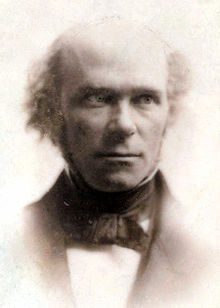A DISCOURSE ON THE TRANSIENT & PERMANENT IN CHRISTIANITY
A Meditation on Theodore Parker and the Call of Liberal Religion
James Ishmael Ford
19 May 2013
First Unitarian Church
Providence, Rhode Island
Text
There are seasons, in human affairs, of inward and outward revolutions, when new depths seem to be broken up in the soul, when new wants are unfolded in multitudes, and a new and undefined good is thirsted for… There are periods when the principles of experience need to be modified, when hope and trust and instinct claim a share with prudence in the guidance of affairs, when, in truth, to dare is the highest wisdom.
William Ellery Channing
The compromise of 1850 was meant to dampen the smoldering tensions between free states and slave, and, I guess, it was successful at least in that it pushed the final and probably inevitably bloody resolution of America’s founding conundrum off for a decade. Among the aspects of the compromise was increasing the authority of the noxious fugitive slave law, baring the harboring of escaped slaves and requiring the cooperation of local authorities anywhere in the country.
In Boston it put Ellen and William Craft in grave danger. They had escaped slavery through what had become a famous and daring act. Ellen’s skin was light enough to pass, and they boldly made their way to freedom first by train and then on two different ships, with Ellen disguised as a white matron and her husband as her slave valet. They settled in Boston where William became a successful furniture maker. They also were Unitarians, joining the then several thousand-member Twenty-Eighth Congregational Society led by the wildly popular, if also equally controversial preacher Theodore Parker.
With the passage of the compromise they were now liable to being taken by slave catchers at any time. Defying the law, their minister took them into the relative safety of his own home, declaring “I will (help a fugitive slave) as readily as I would lift a man out of the water, or pluck him from the teeth of a wolf or snatch him from the hands of a murderer. What is a fine of a thousand dollars, and gaoling for six months, to the liberty of a man?”
During this time Parker composed his sermons with a pistol on his desk and a drawn sword resting nearby. I think about that pistol and that sword. Often. Finally, with Parker’s and other Bostonian abolitionists’ aid, the couple escaped to England.
Others would not be so fortunate. It was a dark time. And, Theodore Parker was there, a prophet calling out to a better way. Not without complexity. I continue to think about that minister with a loaded pistol on his writing desk.
Theodore Parker was born in Lexington on the family farm, in 1810. His paternal grandfather, John, was in command of the Minutemen on that day in April, 1775, when confronting the British regulars, declared, “If they mean to have war, let it begin here.” Which, it did. So, a storied family, but not an affluent one. The family had little money, but everyone saw the brilliance their ninth child, so, with considerable effort, including his own savings from starting teaching at sixteen, they sent him to Harvard, if only as a day student, not eligible for a degree. He moved in very interesting circles. Among his friends and mentors were Ralph Waldo Emerson, Bronson Alcott, and Maria Lydia Child. Pretty much all his friends encouraged him to enter the ministry. Around the same time he met Lydia Dodge Cabot of, yes, those Cabots, of whom it was later said, “the Lowells talk only to Cabots, and Cabots talk only to God.” They fell in love. His parish minister Convers Francis found the necessary money – the Cabot family appears to have helped – to send him to divinity school. In 1837 he graduated, he and Lydia married and he was called to his first church, a tiny congregation of some sixty souls.
Now, the first wave of Unitarianism was highly rationalist, setting a current that continues down to our day. But, quickly there were dissatisfactions; a sense the emerging tradition wasn’t complete. Seeking a fuller view, a more comprehensive religious tradition would be the beginnings of the Transcendentalist movement, a literary phenomenon for America writ large, but a burning theological concern among our spiritual ancestors. Ralph Waldo Emerson was the leading light of that movement. But, Parker, widely read, multi-lingual, and by common ascent usually the smartest person in the room, was quickly seen as Emerson’s equal among the principal Transcendentalists. His place was secured with one sermon. Today is the one hundred and seventy second anniversary of Theodore Parker’s preaching that sermon, “A Discourse on the Transient and Permanent in Christianity” at the ordination of Charles Shackford at the Hawes Place Church, in Boston.
Parker preached an “absolute religion,” where “God was immanent in matter and man,” totally accessible to each of us as our natural right, directly through what was called both “intuition” and “reason,” but was a turning of the heart, and seeing God in everything. In the same sermon, following Emerson’s address, he dismissed biblical miracles and any miraculous authority ascribed to the Bible or Jesus. This was a watershed moment. On the one hand he was denounced by both the orthodox and many of the first wave of Unitarians, even to the point of being denied pulpit exchanges with colleagues for many years, while on the other hand, his congregation, as I mentioned grew to several thousand, and up to seven thousand when he preached on particularly controversial subjects.
While Parker’s Transcendentalism, like Emerson’s owed much to Platonism, with a constant call to some ideal beyond the body, there were at the same time other Transcendentalist currents, such as Thoreau’s attention to the “thing in itself,” an even more naturalistic view, with which I personally find more affinity. But, whether it was Emerson and Parker’s Platonic idealism or Thoreau’s more naturalistic mysticism, Transcendentalism called us to examine our own hearts and the world through that faculty that can be called either intuition or reason.
Parker himself, in that sermon sorting the transient from the permanent, proclaimed, “Christianity is not a system of doctrines, but rather a method of attaining oneness with God. It demands, therefore, a good life of piety within, of purity without, and gives the promise that whoso does God’s will, shall know of God’s doctrine.” Parker articulated a radical doctrine, declaring we are our true selves when we have nothing between God and us, between the ultimate and me
If his life stopped there, he would be assured a place in our liberal pantheon.
But there was also that man who wrote sermons with a pistol on his desk. I think about that, and that he also was a member of the Secret Six, who underwrote John Brown’s abortive attempt to arm a slave rebellion. Several of the six fled to Canada. Parker had developed tuberculosis and was in Europe, where he died. Otherwise, who knows, he could have been charged with treason, today, perhaps abetting terrorism.
Theodore Parker’s sense was that his direct encounter with the divine also called him into a life of action, to see the divine everywhere, to perceive a divine harmony, and then to act in its service. One biographer noted his advocacy for “temperance, education, the condition of women, penal legislation, prison discipline, the moral and mental destitution of the rich, (and) the physical destitution of the poor.” He called for universal suffrage for both women and African Americans. His views on race were in fact complicated, but he moved quickly to call for integration at home and abolition for the country, with ever increasing urgency. During that foreshadowing of the Civil War in Kansas, he raised money for guns and ammunition. As we know he resisted the fugitive slave law and even helped to underwrite, as I said, John Brown’s abortive slave revolt.
He was a complex person, he did not, I gather, play well with others. And this caused a lot of probably unnecessary hurt. But, he also pushed our Association toward an ever-larger faith, one that would allow in good time, us, in all our wild glory. When he died in Florence, he was not quite fifty years old. On occasion I wonder, what if.
I find him enormously attractive, and so important. Not least because he challenges us, even today. For instance, in 1853, Theodore Parker had preached another sermon, “Justice and the Conscience.” There he proclaimed, “I do not pretend to understand the moral universe; the arc is a long one, my eye reaches but little ways; I cannot calculate the curve and complete the figure by the experience of sight; (but) I can divine it by conscience. And from what I see I am sure it bends towards justice.” A century and almost a decade later, Martin Luther King, Jr, another admirer of Parker, who often cited the old Transcendentalist in his sermons, called out to us, “I come to say to you this afternoon, however difficult the moment, however frustrating the hour, it will not be long, because truth crushed to earth will rise again. How long? Not long, because no lie can live forever. How long? Not long, because you shall reap what you sow…. How long? Not long, because the arc of the moral universe is long, but it bends toward justice.”
And Parker’s influence continues, modified, corrected, expanded. Four decades and three years after Dr King’s words, our president Barack Obama, speaking on the anniversary of his assassination, proclaimed, “Dr. King once said that the arc of the moral universe is long but it bends towards justice. It bends towards justice, but here is the thing: it does not bend on its own. It bends because each of us in our own ways put our hand on that arc and we bend it in the direction of justice….”
Here I think we find what Theodore Parker called us to: To see the connections, to reflect on those connections, and then to act in the world inspired by those connections, each of us, in our own way.
We won’t always be right. The natural world isn’t about perfection. Our way is about paying attention, acting, correcting, reflecting, and acting again. And, here’s some good news: so far as our human lives are concerned, we do this, and on balance, on balance, mysterious, wondrous, joyful things will emerge.
We do this, and not only will our own hearts find healing, but, our world itself, and the arc of history might indeed, be bent in that divine direction.
This is Theodore Parker’s faith. And, it is ours.
Amen.













